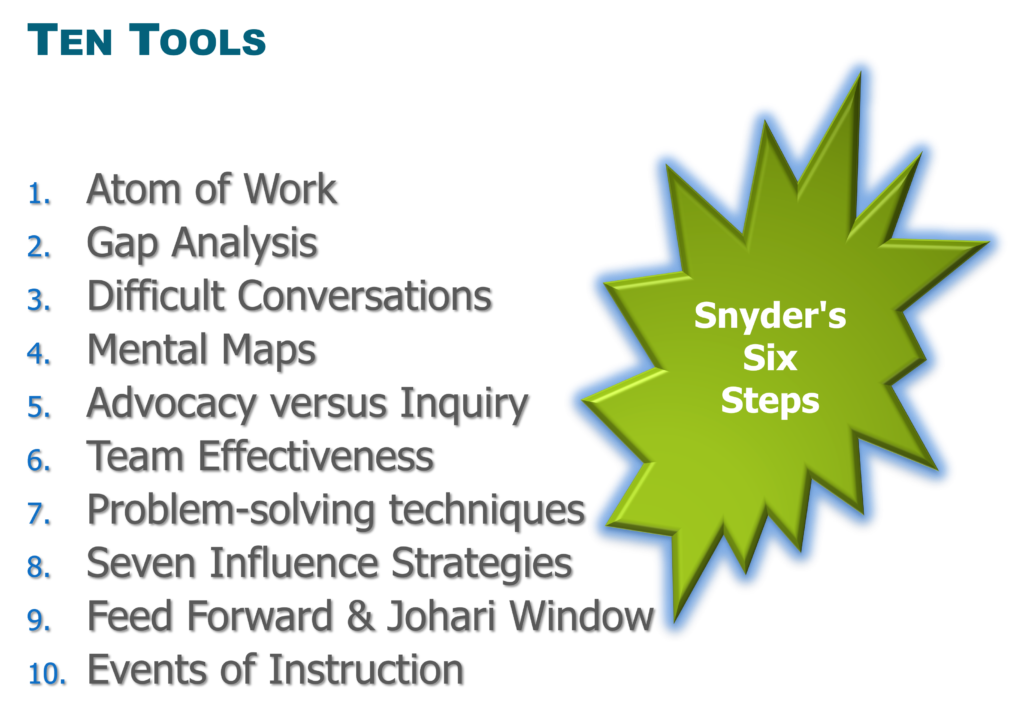
Consider these questions:
- How do I know that I am doing the right task? Adding value?
- How will I know when I’m successful at work?
- How do I deal with breakdowns and battles that occur in my activities and interactions?
- How can I make others and especially my group members more effective?
- How do I learn as I go along and help others to learn?
If you have ever posed them to yourself then you are part of a very large community of those of us who do work in organizations. And you are one of the reasons why this set of webpages exists for everyone for free.
Welcome to the front page of Ten Tools! These models and techniques can aid interested individuals as they face many of the most frequent but paradoxically difficult demands people face in contemporary organizations:
Over three decades, we explored a variety of tools to identify a set of proven ‘devices’ to aid a variety of individuals seeking to be effective at work and successful in attaining their personal goals. We call them The Ten Tools.
What are some uses of these tools?
- Want to avoid breakdowns around what you think you promised to produce and what a ‘boss’ may be expecting? Use the Atom of Work
- What if the breakdown is already happening? Employ the tips from our Advocacy Versus Inquiry section and if that doesn’t work then the tactics covered in Difficult Conversations will prove invaluable
- How can you be sure that a proposed solution is actually going to make a difference? Start out by using the Gap Analysis tool as well as Problem-Solving Techniques
- Trying to make your team more successful? The tools in our Team Effectiveness section are based on decades of research on how to do just that
- Suspicious that everybody isn’t on the same page as they approach a project? Roll out our Mental Maps tool to discover exactly how everyone envisions the work
- Are you part of a group that is supposed to effect a significant organizational change? Then the Seven Influence Strategies section will give you confidence that you can make that change happen
- Responsible for helping someone to learn? Events of Instruction is the section for you
- And if you’re looking for the best ways to develop yourself, starting with the Feedforward and Johari Window section will provide you with a highly pertinent guide
- Finally, if what comes out of that investigation indicates a need to change you will want to absorb Snyder’s Six Steps, which is still the clearest guide to successful navigation of the changes and crises we sometimes face
Links to 10 Tools Videos and Additional Sources
The links below direct you to videos of lectures that explain each one of the Ten Tools As Well as PowerPoint presentations and links to the original resources of those individuals and teams that developed these concepts:
- Introduction to The Ten Tools
- The Atom of Work borrowed from the writings of Fernando Flores
- Gap Analysis inspired by the work of Jim Robinson and Dana Gaines Robinson
- Difficult Conversations borrowed from the book by Bruce Patton, Douglas Stone, and Sheila Heen
- Mental Maps borrowed from the writings of Gervase Bushe
- Advocacy Versus Inquiry borrowed from the writings of Rick Ross and Charlotte Roberts in Fifth Discipline Field Book edited by Peter Senge; go to page 253 and you’ll see the images that are here and here
- Feedforward and the Johari window borrowed respectively from the writings of Marshall Goldsmith AND Joseph Luft & Harry Ingham
- Team Effectiveness borrowed from the writings of Hackman, Argyris, and Roger Schwarz
- Problem-solving techniques from the writings of Arthur Van Gundy
- Seven Influence Strategies borrowed from Book by Edwin C. Nevis, Helen C. Vassallo, and Joan E. Lancourt
- Events of Instruction from the writings of Margaret Gredler AND Gagne & Briggs
- Bonus: Snyder’s 6 Steps inspired by the work of CR ‘Rick’ Snyder including the Hope Scale
Perhaps you desire further clarification or consultation. If that’s the case, then reach out via the form below. Questions? Ideas? Feedback of ANY sort? Fill out the form below. We hope these 10 tools proved to be helpful.